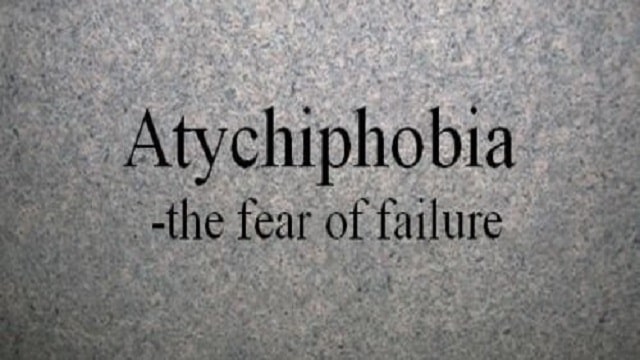Atychiphobia is an intense fear of failure. People with this condition may avoid any situation in which they might fail, such as exams or job interviews. It can also involve fear of failed social relationships, career failure, or disappointing others.
Fear often affects the overall outcome of a job. For example, if someone is so afraid of failing a test that they refuse to take the test, they will likely fail the entire test. Many people with this condition keep this fear to themselves or may not realize that they have this phobia.
Symptoms of Atychiphobia
There are several symptoms of people who are afraid of failure, such as:
- Fear of doing simple tasks at work, home, or school.
- Angry or irritable.
- Fear of being judged by others.
- Depressed or sad.
- Pessimistic (negative outlook on life).
- Tends to procrastinate if a task or activity seems challenging.
- Unable to maintain a relationship.
- Unwilling to accept constructive criticism or suggestions.
- Feeling separated from yourself.
- Feeling like you’re losing control of a situation.
- Thinking that I was going to faint.
- Feeling helpless over his fears.
If the above symptoms are emotional symptoms, this phobia can also trigger some physical symptoms, such as:
- Out of breath.
- The heart beats very fast.
- Tightness or pain in the chest.
- A shaking sensation.
- Dizziness or mild headache.
- Indigestion.
- Hot or cold flashes.
- Sweating.
Causes of Atychiphobia
There are several possible causes for this fear, including:
- Family History. If a mental disorder such as phobia, anxiety, or depression occurs in one family member, it is likely that other family members may experience this condition.
- Environmental Influences. A person may be raised in an environment where people think that failure is unacceptable, or that it is okay to be imperfect.
- Other Phobias. Phobias can sometimes occur together. For example, a child with sholionophobia (fear of school) may also have atychiphobia.
- Traumatic Experiences. If someone has experienced abuse or severe punishment for failure, he or she may be afraid of experiencing those consequences again. Or if someone feels that past failures have led to terrible consequences, such as death or destruction.
Risk Factors for Atychiphobia
There are several risk factors associated with developing this phobia. In general, a person may be at higher risk of developing atychiphobia if:
- Having a failed experience in the past, especially if the experience was traumatic or had dire consequences, such as losing a job.
- Have thought about being afraid of failing through various situations.
- A perfectionist or always wants perfect results.
Seeing others fail also contributes to the development of this phobia. Someone who grew up with parents who always told them not to fail may also develop this condition.
Diagnosis of Atychiphobia
There is no specific medical test to diagnose this phobia. A doctor will diagnose the condition based on a discussion with the sufferer about:
- Symptoms that appear.
- Long time suffering from phobia.
- How severe is this phobia that interferes with daily life?
The doctor will also try to determine whether the sufferer has other mental health disorders, such as:
- Avoidant personality disorder.
- Depression.
- Eating disorders.
- Anxiety disorders (hypochondria).
- Obsessive-compulsive disorder (OCD).
- Panic disorder.
- Paranoid personality disorder.
- Post-traumatic stress disorder (PTSD).
- Substance abuse disorders such as drug addiction or alcoholism.
Atychiphobia Treatment
There are various ways to treat the fear of failure, including:
- Cognitive Behavioral Therapy (CBT)
CBT is a form of psychotherapy that can help change negative thoughts about failure. Therapists can help people see that some of the things they consider “failures” are actually positive opportunities for learning and growth.
Therapists can also provide helpful strategies for dealing with fear and anxiety such as deep breathing or meditation.
- Exposure Therapy
Gradually exposing yourself to the source of your fear can help you overcome your fear response. For example, a therapist might ask you to recreate a scenario in which you felt like you failed in the past.
This therapy is conducted in a safe and supportive environment so that the sufferer can see that there is no threat or danger in failure.
- Drugs
If the sufferer has another mental health disorder such as depression or anxiety, medication can help manage the symptoms. However, medication is not the first choice of therapy for phobias.
Complications of Atychiphobia
Atychiphobia can cause panic attacks, which can lead to several complications, such as:
- Fever.
- Dizziness and headache.
- Excessive sweating (hyperhidrosis).
- Heart palpitations.
- Nauseous.
- Shortness of breath (dyspnea).
- Stomach ache or indigestion (dyspepsia).
Prevention of Atychiphobia
Phobias usually can’t be prevented, but you can take steps to reduce their severity, such as:
- Creating a strong support system of friends and family members.
- Do not consume caffeine or alcohol or use drugs, which can worsen stress and anxiety.
- Get help from a healthcare provider as soon as you realize that your fear is affecting your life.
- Practice a healthy lifestyle, such as eating healthy foods and getting enough sleep.
When to See a Doctor?
You should contact a healthcare provider immediately if the symptoms that appear are interfering with your daily life.
In addition, you can also visit a doctor if your phobia starts to develop into a dangerous panic attack.

